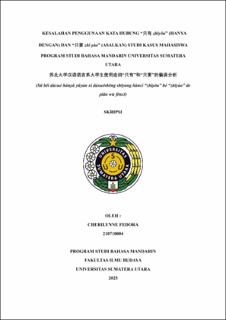Kesalahan Penggunaan Kata Hubung “只有 zhǐyǒu” (Hanya Dengan) dan “只要 zhǐ yào” (Asalkan) Studi Kasus Mahasiswa Program Studi Bahasa Mandarin Universitas Sumatera Utara
Errors In The Use Of The Conjunctions “只有 zhǐyǒu” (Only If) AND “只要 zhǐ yào” (As Long As): A Case Study Of Students In The Mandarin Language Study Program At The University Of North Sumatra

Date
2025Author
Fedora, Cherilynne
Advisor(s)
Ayuningtias, Niza
Jessy
Metadata
Show full item recordAbstract
Mastery of conjunctions in Mandarin is essential for constructing logical and cohesive sentences. However, in learning Mandarin as a foreign language, students often misuse the conditional conjunctions 只有 (zhǐyǒu) and 只要 (zhǐyào), as they have similar meanings but different sentence structures. This study aims to describe the types and causes of errors in using these conjunctions among 2022 students of the Mandarin Language Study Program at the University of North Sumatra. The research uses a descriptive qualitative method, with data collected through written questionnaires from 20 students. Based on Corder's theory, the errors found include omission, substitution, and misordering. The most common error was substitution, such as using mismatched conjunction pairs and omitting required elements. The main cause was students’ lack of understanding of the differences in meaning and structure between the two conjunctions.
Collections
- Undergraduate Theses [323]
